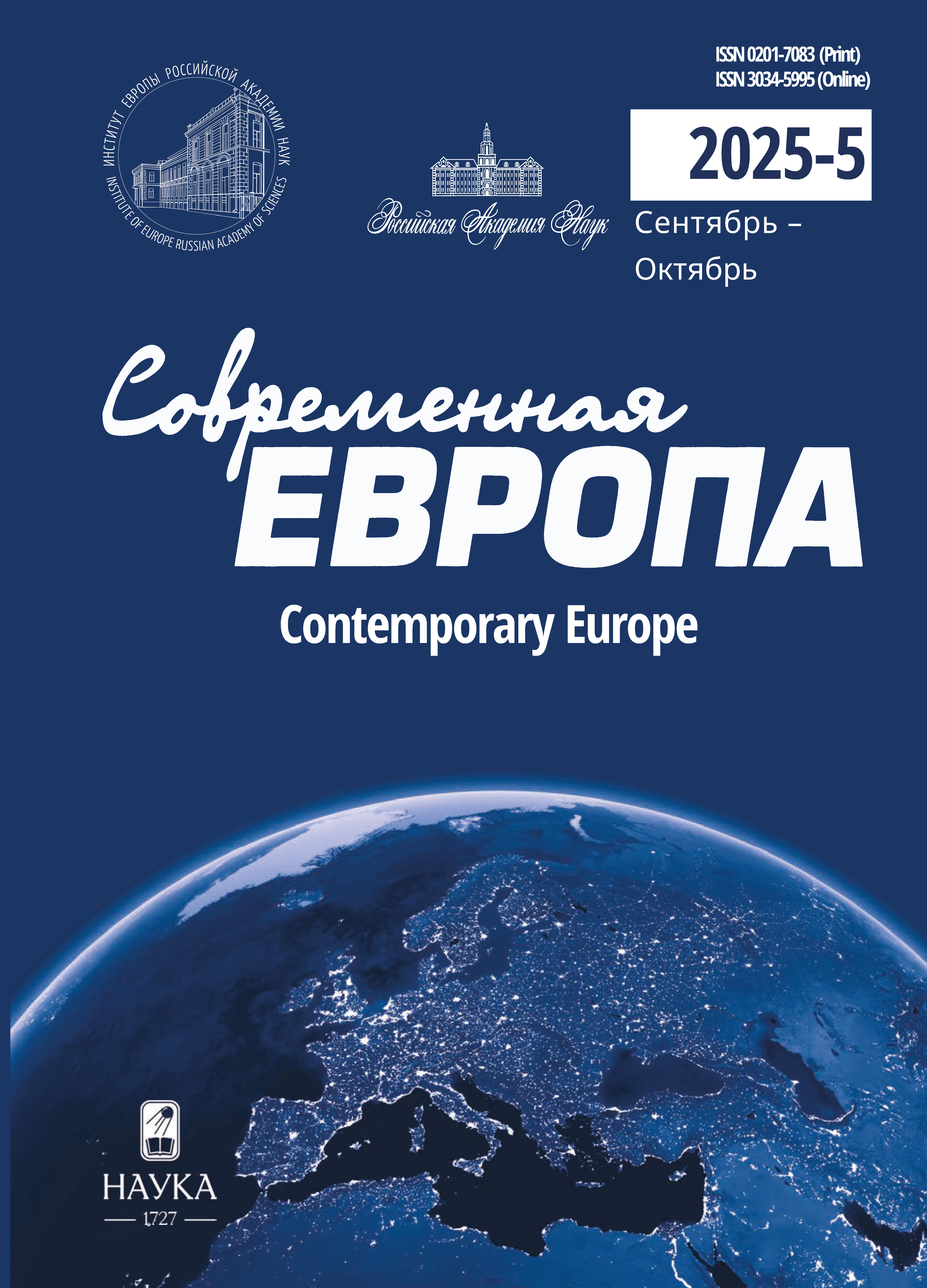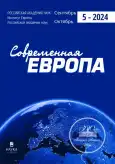The EU Strategic Approach to China (2016‒2023)
- Authors: Leushkin D.V1, Samoilov N.G2
-
Affiliations:
- Institute of International Relations and World History, National Research Lobachevsky State University of Nizhny Novgorod
- Saint Petersburg State University
- Issue: No 5 (126) (2024)
- Pages: 49-59
- Section: EUROPEAN PROCESS: COUNTRIES AND REGIONS
- URL: https://rjsvd.com/0201-7083/article/view/652314
- DOI: https://doi.org/10.31857/S0201708324050048
- ID: 652314
Cite item
Abstract
The goal of the article is to identify the main stages of the formation of the ambivalent image of the PRC in the European discourse, as well as the causes and factors that determined the transformation of the approach to China in official documents and statements, including the points of view of a number of European think tanks. The first stage is related to the emergence of prerequisites for the deterioration of bilateral relations due to the intensification of economic contradictions. The second one is linked to Beijing’s dual role as a partner and competitor becoming mainstream in Europe in the context of the deteriorating relations. Finally, the third stage is associated with the growing EU’s ambitions in ensuring international and regional security, in particular those highlighted in the Strategic Compass, and negative attitude of the EU towards the Chinese stance on the Russo-Ukrainian conflict. The authors use a world-systems approach, focusing on the influence of external economic factors on the development of the European dis-course towards China. The research relies on the analysis and comparison of the EU documents, official statements made by heads and representatives of the European institutions, as well as publications provided by experts and analytical centres studying relations between the EU and PRC. The consolidation of China’s contradictory image as both partner and rival in the official European discourse and expert community is quite natural. It is related to the aggravation of the crisis of the world-system itself, transformation of the world order, as a result, the actualisation of economic disagreements, which can be illustrated by the EU’s trade deficit with China. Brussels’ modern approach to Beijing fits into the logic of the confrontation between «democracies» and «autocracies» – the conflict with China is publicly covered not as an economic rivalry, but as an existential struggle between different political systems articulated in ideological terms. The authors believe that such an internally contradictory approach to China will remain dominant in the face of the above-mentioned issues.
Keywords
About the authors
D. V Leushkin
Institute of International Relations and World History, National Research Lobachevsky State University of Nizhny Novgorod
Email: den.leushkin@mail.ru
Candidate of Science (Politics), Associate Professor Nizhny Novgorod, Russia
N. G Samoilov
Saint Petersburg State University
Email: samoilovng@gmail.com
School of International Relations Saint Petersburg, Russia
References
- Белов В.Б. (2023) Германо-китайские экономические отношения в условиях актуальных геополи-тических вызовов. Современная Европа. № 7. С. 111‒126.
- Belov V.B. (2023) Germano-kitaiskie ekonomicheskie otnosheniya v usloviyakh aktual'nykh geo-politicheskikh vyzovov [German-Chinese Economic Relations in the Context of Current Geopolitical Challenges], Sovremennaya Evropa, 7, pp. 111‒126. (In Russian).
- Буторина О.В., Алексеенкова Е.С. (ред.) (2022) Фактор Китая в Средиземноморье. ИЕ РАН, Москва. 200 с.
- Butorina O.V., Alekseenkova E.S. (ed.) (2022) Faktor Kitaya v Sredizemnomor'e [The China Factor in the Mediterranean], IE RAS, Moscow, Russia. (In Russian).
- Буторина О.В. (2023) Торговля Евросоюза с Китаем: проблема дефицита. Современная Европа. № 7. С. 5‒20.
- Butorina O.V. (2023) Torgovlya Evrosoyuza s Kitaem: problema defitsita [EU Trade with China: the Problem of Scarcity], Sovremennaya Evropa, 7, pp. 5‒20. (In Russian).
- Данилин И.В., Квашнин Ю.Д., Кислицын С.В., Кобринская И.Я., Ломанов А.В., Уткин С.В. (2022) Евросоюз-Китай в меняющемся мироустройстве. Мировая экономика и международные отношения. № 1. C. 68‒79.
- Danilin I.V., Kvashnin Y.D., Kislitsyn S.V., Kobrinskaya I.Ya., Lomanov A.V., Utkin S.V. (2022) Evrosoyuz-Kitai v menyayushchemsya miroustroistve [European Union – China in the Changing World Composition], World Economy and International Relations, 1, pp. 68‒79. (In Russian).
- Носов М.Г. (2018) ЕС и Китай: торговля и стратегия. Современная Европа. № 6. С. 5‒17.
- Nosov M.G. (2018) ES i Kitai: torgovlya i strategiya [EU and China: Trade or Strategy], Sovremennaya Evropa, 6, pp. 5‒17. (In Russian).
- Носов М.Г. (2015) ЕС – Китай. Европейский союз в поиске глобальной роли: политика, экономика, безопасность. Под общ. ред. Ал.А. Громыко, М.Г. Носова. ИЕ РАН; Весь Мир, Москва. С. 269‒287.
- Nosov M.G. (2015) ES – Kitai, in Al.A. Gromyko, M.G. Nosov (ed.) Evropeiskii soyuz v poiske glob-al'noi roli: politika, ehkonomika, bezopasnost' [The European Union in Search of Global Role: Politics, Economy, Security], IE RAN; Ves' Mir, Moscow, Russia, pp. 269‒287. (In Russian).
- Alves D.R. (2023) The EU’s discourse coherence and its relationship with China: a new normative actor? SN Social Sciences. Vol. 4. P. 1‒21.
- Andersson J.J., Cramer C.S. (2023) Yearbook of European Security. EUISS, Paris, France. 115 p.
- Crosson D.M., Benaglia S., Vermeulen L. (2023) Future-proofing EU Security and Defence Cooperation in the Indo-Pacific: Doubling down with Friends. CEPS, Brussels, Belgium. 9 p.
- Ekman A. (2023) China’s Global Security Initiative. Brief 5. EUISS, Paris, France. 4 p.
- Ekman A. (2022) China and the Battle of Coalitions. The “Circle of Friends” Versus the Indo-Pacific Strategy. Chaillot Paper 174. EUISS, Paris, France. 59 p.
- Ekman A. (2020) What if… We Avoided Wordplay with China? What if… Chaillot Paper 157. Ed. by F. Gaub. EUISS, Paris, France. P. 8‒13.
- Fiott D., Lindstrom G. (2021) Strategic Compass: New bearings for EU Security and Defence? Chaillot Paper 171. EUISS, Paris, France. 62 p.
- Fiott D. (2021) Naval Gazing? The Strategic Compass and the EU’s Maritime Presence. Brief 16. EUISS, Paris, France. 8 p.
- Sanchez Cacicedo A. (2023) India’s G20 Presidency: A Showcase for Skilful Minilateralism. Brief 17. EUISS, Paris, France. 8 p.
Supplementary files











